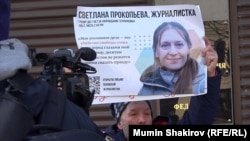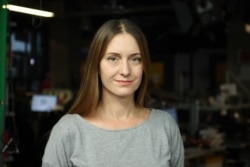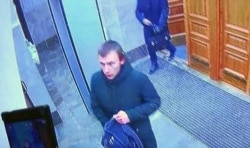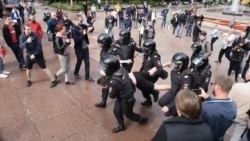On March 12, the prosecutor’s office in Russia’s Pskov region informed a local journalist, Svetlana Prokopyeva, that a criminal investigation targeting her had been completed and that she had been indicted on charges of publicly justifying terrorism. If convicted, Prokopyeva could serve seven years in prison.
The prosecutor’s charge is misleading.
A transcript of Prokopyeva’s commentary shows that her remarks were explanatory and not meant to endorse violence.
Prokopyeva is a prominent journalist in Pskov, where she freelances for Radio Free Europe. (Disclosure: Voice of America and RFE are both independent news organizations funded by the U.S. government under the United States Agency for Global Media.) She has hosted a political talk show for a local affiliate of Ekho Moskvy radio and worked as an investigative reporter for the Pskovskaya Lenta Novostei news agency.
The terrorist attack
On Oct. 31, 2018, Mikhail Zhlobitsky, a 17-year-old student, walked into the office of the Federal Security Service (FSB) in the city of Archangelsk in northern Russia, took a IED (improvised explosive devise) out of his backpack and detonated it. Zhlobitsky died on the spot, and the blast wounded three FSB officers. The Russian National Anti-terrorism Committee called it a terrorist attack.
Zhlobitsky, later identified as a member of an anarcho-communist national-radical group, reportedly left a manifesto saying he had decided to launch a suicide bombing “because the FSB fabricates cases and tortures people.”
What did Prokopyeva say?
On Nov. 7, 2018, Prokopyeva commented on the Arkhangelsk attack on her Ekho Moskvy Pskov program. Those comments became the basis of the criminal prosecution charge. A transcript of the program has been classified as “extremist material” and banned from distribution in Russia under the threat of prosecution.
A full transcript of Prokopyeva’s original broadcast is available in Russian on Medium.com.
According to Prokopyeva, parts of her radio commentary that upset the Russian authorities the most and figured in her prosecution include the following:
“A strong state. A strong president, a strong governor. A country wherepower belongs to the security forces. The generation to which the Arkhangelsk bomber belonged grew up in this atmosphere. They know that you can 't go to demonstrations — they will disperse you, or even beat you, and then they will convict you.”
“The many years of restricted political and civil liberties have created in Russia not just an unfree, but a repressive state. A state that is unsafe and scary to deal with.”
“A state that is repressive towards its own citizens is now being met with a response. A young citizen who saw only prohibitions and punishments from the authorities could think of no other means of communication. Cruelty begets cruelty. A ruthless government has produced a citizen who has made death his argument. Let’s hope he is an exception.”
In her broadcast, Prokopyeva made clear that she does not condone terrorism and violence, saying such acts are “monstrous.” Her employer at the time, Pskovskaya Lenta Novostei, published a full transcript of the broadcast.
Two months later, in December 2018, the Russian state watchdog Roscomnadzor ordered Ekho Moskvy and Pskovskaya Lenta Novostei to take down Prokopyeva’s program and fined them for distributing extremist material.
Three months after her broadcast, in February 2019, the Pskov regional prosecutor’s office launched a criminal investigation, and the Investigative Committee indicted Prokopyeva in September 2019. She has said the case is motivated by her critical coverage of the government. In an open letter published in October 2019, she called it “banal revenge" by "offended siloviki" whom she blamed for the Arkhangelsk bombing.
"I did not justify the terror attack, I analyzed its causes," she wrote, while the case against her is "the assassination of press freedom."
The charges were based on Article 205.2 of the Russian Criminal Code, concerning public calls to commit terrorist activity or public justify terrorism.
International human rights and media organizations have called the accusations against Prokopyeva “bogus” and demanded that Russian authorities drop the charges against her.








